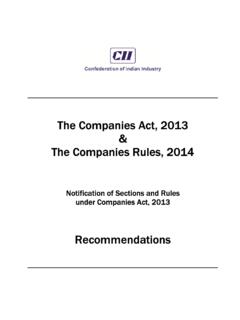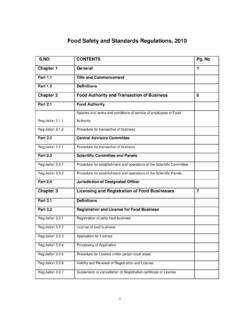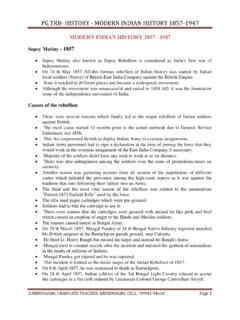Transcription of The Companies Act, 2013The Companies Act, 2013 &&&& …
1 The Companies Act, 2013 The Companies Act, 2013 The Companies Act, 2013 The Companies Act, 2013 &&&& The Companies Rules, 2014 The Companies Rules, 2014 The Companies Rules, 2014 The Companies Rules, 2014 Notification of Sections and RulesNotification of Sections and RulesNotification of Sections and RulesNotification of Sections and Rules under Companies Act, 2013under Companies Act, 2013under Companies Act, 2013under Companies Act, 2013 RecommendationsRecommendationsRecommenda tionsRecommendations Confederation of Indian Industry Page 1 Notification of Sections and Rules under Companies Act, 2013 Suggestions / Clarifications Required With the notification of multiple sections of the new Companies Act, 2013 ( new Act ) and subordinate legislation in the form of rules, Companies are faced with the challenge of complying with the new legal regime in a matter of a few days.
2 This is because most of the sections and rules thereunder were notified in the last week of March, 2014 - to be in effect from 1 April, 2014. CII has been in receipt of numerous views and requests for revisions / clarifications of complying with the new requirements. A detailed note on such views is given herebelow with an earnest request to the Ministry of Corporate Affairs to review / clarify them. FORMATION OF COMPANY 1. Requirement - Private Company - Subsidiary of Foreign Company By combined reading of Sections 2(71) and 2(87) of the Act, it is not clear whether a private company which is a subsidiary of a foreign body corporate will be deemed to be a public company and the law will be applicable to it as such.
3 Provisions akin to Section 4(7) of the Companies Act, 1956 also does not exist under the new Act. Suggestion Section 2(20) of the 2013 Act defines the term company to mean a company incorporated under the Companies Act 2013 or any previous company law. Accordingly, a company, which is incorporated under the relevant legislation of a foreign country, will not qualify as a company under the 2013 Act The proviso to section 2(71) states that a company which is a subsidiary of a company, not being a private company, shall be deemed to be public company for the purposes of this Act.
4 Section 2(87) defines the terms subsidiary in relation to any other company. The sub-section states that for the purposes of such definition, the expression company includes body corporate . Under the 1956 Act, the issue regarding Companies incorporated outside India is dealt with under the section 4(7). The section read as below: A private company, being a subsidiary of a body corporate incorporated outside India, which, if incorporated in India, would be a public company within the meaning of this Act, shall be deemed for the purposes of this Act to be a subsidiary of a public company if the entire share capital in that private company is not held by that body corporate whether alone or together with one or more other bodies corporate incorporated outside India.
5 Confederation of Indian Industry Page 2 A similar provision does not exist under the 2013 Act. This has resulted in an ambiguous position with regard to private Companies which are subsidiaries of foreign public Companies . A foreign company is not a company under the 2013 Act as used in the proviso to section 2(71). Hence, the proviso to section 2(71) is not triggered. Under this argument, a private company, which is subsidiary of foreign company, will always be a private company. We believe this is the intent of the new 2013 law and the benefit of private limited status will be available to subsidiaries of foreign Companies .
6 Apparently, the concept enshrined in section 4(7) of the 1956 is therefore not separately contained in the 2013 Act. This issue impacts many key requirements under the new Act , requirements concerning Woman Director, Independent Directors, Audit Committee and Nomination & Remuneration Committee (NRC) as well as auditor rotation. MCA should clarify this position so that there is no ambiguity around the continuing availability of the protection [similar to the earlier protection provided under the erstwhile Section 4(7)] in the new Act 2. Requirement Format of Memorandum and Articles of Association Per the old Act, Memorandum of Association was to be divided into three parts viz.
7 Main, ancillary and other objects. The format of MOA is prescribed under this act in Table B to E of the Schedule I. (Section 13). In the Companies Act 2013, the bifurcation of the object clause into main, ancillary and other objects has been dispensed with. New format as per Table A to E of Schedule I of the act are prescribed. (Section 4) Suggestion It needs to be clarified whether Memorandum of Association and Articles of Association have to be amended to conform to the new formats prescribed under the new Act 3. Requirement One person Company Rule 3(1) provides that only a natural person who is an Indian citizen and resident in India shall be eligible to incorporate OPC No person shall be eligible to incorporate more than one OPC or become nominee in more than one such company OPC to compulsory convert itself into public or private company in certain cases.
8 Where the paid up share capital of an OPC exceeds fifty lakh rupees or its average annual turnover during the relevant period exceeds two crore rupees, it shall cease to be entitled to continue as a One Person Company. Suggestion Body Corporate and Foreign Citizen resident in India should also be allowed to form OPC subject to fulfilling some conditions. Allowing only natural persons and Indian Citizen to make use of OPC provisions is too restrictive. Confederation of Indian Industry Page 3 Restrictions on formation / becoming nominee of not more than one OPC should be increased to 5 as it was in draft rules.
9 In draft rules, the maximum cap/ ceiling put on an individual incorporating One Person Company (OPC) was Five (5), but in final rules, the limit has been reduced to One (1). Which means an individual can only incorporate and maintain only one OPC, which is restraining from carrying on more than one business in individual capacity. Requirement of OPC to convert its status upon reaching the financial caps stipulated under the rule should be removed or increased. The requirements are substantially narrowing down the scope of One-Person Company to be practically used as a vehicle of facilitating business only for start-ups businesses in India.
10 4. Requirement - Shifting of Registered Office within the same state Rule 28 read with Section 12 provides that shifting of registered office is not be allowed if any inquiry, inspection or investigation has been initiated against the company or any prosecution is pending Suggestion It needs to be explained that the restriction on shifting of registered office shall not apply in case the inquiry, inspection or investigation has been completed. It is not specified on completion of such inquiry, inspection or investigation, restriction will be removed or not 5.







